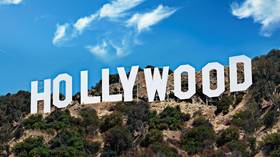Hollywood writers go on strike


Movie and television production in Hollywood and beyond is set to be severely impacted after unions representing writers voted to begin a strike on Tuesday. The step comes amid a dispute with studios over working conditions and the shift brought about by the rise of streaming platforms such as Netflix.
Chief among the writers’ complaints is reduced pay caused by the dominance of online streaming, which they say is leading to shorter seasons and diminished financial returns. Many production studios have adapted their business strategies to account for a drop in advertising revenue as the industry shifts away from the traditional network television model.
“The companies’ behavior has created a gig economy inside a union workforce, and their immovable stance in this negotiation has betrayed a commitment to further devaluing the profession of writing,” read a statement on the Writers Guild of America (WGA) website.
The dispute targets traditional production companies such as Paramount and Universal, as well as streaming platforms such as those offered by Amazon, Netflix, and Apple.
The union added that “the companies have broken this business. They have taken so much from the very people, the writers, who have made them wealthy.”
In response, the Alliance of Motion Picture and Television Producers (AMPTP) said it was willing to offer higher residual pay and address concerns about working conditions, but expressed opposition to a number of other proposals “that the Guild continues to insist upon.”
Among the WGA’s myriad requests is a guarantee from producers that scripts will not be generated using artificial intelligence (AI), and that writers will not be asked to edit or rewrite screenplays created using the technology.
The industrial action voted for by the WGA means that late-night shows such as those hosted by Jimmy Fallon, Jimmy Kimmel, and Stephen Colbert will cease production immediately. Additionally, many major motion pictures on the release slate for 2023 could be substantially delayed, while serialized television shows scheduled for later in the year could likewise be affected.
It is the first work stoppage in the US entertainment industry in 15 years – with the previous strike in 2007 lasting for 100 days and costing the Californian economy an estimated $2.1 billion.
Several other entertainment industry unions, such as those representing actors and directors, have expressed solidarity with writers. The Screen Actors Guild (SAG) and Directors Guild of America (DGA) are set to hold their own talks with studio executives this summer.